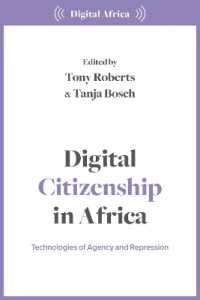- ホーム
- > 洋書
- > 英文書
- > Business / Economics
Full Description
Because of their fundamental mission, generating knowledge through research and disseminating it via teaching and publications, Higher Education Institutions (HEIs) can serve as a vehicle for enacting new worldviews and approaches for sustainability transformation. This book explores the realised and unrealised potential of HEIs to achieve this, adopting a relationship quality management framework. This involves understanding the sustainability needs, preferences, and behaviours of both internal and external stakeholders to deliver satisfying stakeholder experiences, co-creating and communicating sustainable value, thereby fostering stakeholder trust and long-term commitment.
This book presents relationship quality management concepts and tools for identifying and transforming stakeholder sustainability needs into action for the benefit of HEI's sustainability transformation. It includes practical insights into the application of relationship quality management tools such as Kano-analysis, the measurement of perceived service quality in higher education (HEdPERF), stakeholder and materiality matrix, Quality Function Deployment (QFD), Analytic Hierarchy Process (AHP), or the Net Promoter Score (NPS) for assessing HEI customer satisfaction and referral behaviour. It will be of great interest to scholars and students, as well as HEI employees working on sustainability strategy and stakeholder engagement.
Contents
Chapter 1: The Role of Higher Education Institutions in Promoting Sustainability in the Anthropocene.- Chapter 2: Fundamentals and Principles of Relationship Quality Management in the Sustainability Transformation of Higher Education Institutions.- Chapter 3: Stakeholder Analysis in the Sustainability Transformation of Higher Education Institutions.- Chapter 4: Segmenting Stakeholders for Higher Education Institutions Sustainability Transformations.- Chapter 5: CoCreating Sustainable Value through Stakeholder Partnership in Higher Education Institutions.- Chapter 6: Transforming Stakeholder Needs and Innovative Ideas into Sustainable Actions in Higher Education Institutions.- Chapter 7: Authentically Communicating Sustainability Engagements of Higher Education Institutions to Reduce Tensions.- Chapter 8: Measuring Success of Sustainability Transformations in Higher Education Institutions.- Chapter 9: Challenges Opportunities and Emerging Trends in Integrating Relationship Quality Management into the Sustainability Transformation of Higher Education Institutions.- Chapter 10: Plan of Action for Relationship Quality Management based Sustainability Transformation at Higher Education Institutions.








